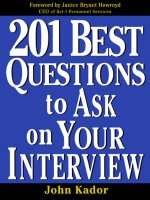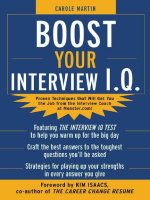Interview Guidelines
Bạn đang xem bản rút gọn của tài liệu. Xem và tải ngay bản đầy đủ của tài liệu tại đây (2.72 MB, 48 trang )
Chapter 14, Slide 1
Mary Ellen Guffey, Essentials of Business Communication, 8e
Business
Communication
Donald R. Simon, Esq.
Adjunct Professor - KCKCC Leavenworth Center
Fall 2010
Chapter 14, Slide 2
Mary Ellen Guffey, Essentials of Business Communication, 8e
Business Communication
Lecture: “Interviewing
and Following-Up”
Grammar and correction
exercises
Mary Ellen Guffey, Essentials of Business Communication, 8e Chapter 14, Slide 3
Types of Employment Interviews
To weed out
unqualified candidates.
Often conducted by
telephone.
To learn whether a
candidate is a good fit for
the organization. Usually
conducted in person.
Goal
Hiring/
placement
Screening
Mary Ellen Guffey, Essentials of Business Communication, 8e Chapter 14, Slide 4
One-on-one
Panel
Group
Sequential
Stress
Screening
Hiring/
placement
Types of Employment Interviews
Mary Ellen Guffey, Essentials of Business Communication, 8e Chapter 14, Slide 5
Interview Success Requires
an Effective Game Plan
During
the
interview
Before
the
interview
After
the
interview
Mary Ellen Guffey, Essentials of Business Communication, 8e Chapter 14, Slide 6
Using Professional Phone
Techniques
Invest in a good answering machine
or voice mail system.
Alert your family; don’t let children
answer.
Beware of answering cell calls.
Use voice mail to screen calls.
During After Before
Mary Ellen Guffey, Essentials of Business Communication, 8e Chapter 14, Slide 7
Making the First Conversation
Impressive
Ask the employer to
send a copy of the
job description and
other company
information.
Confirm the date and
time of promised
interview.
Near the telephone
keep your resume
and a list of positions
for which you have
applied.
Treat any call from an
employer as an
interview.
Take good notes;
obtain accurate
directions.
Mary Ellen Guffey, Essentials of Business Communication, 8e Chapter 14, Slide 8
Researching the Target
Company
Research in the library, campus career
center and the Web for information.
Know the leaders, company products,
finances, goals, competition,
accomplishments, and setbacks.
If possible, interview employees.
Consult blogs.
During After Before
Mary Ellen Guffey, Essentials of Business Communication, 8e Chapter 14, Slide 9
Prepare and Practice
Study the job description. How do your
skills and accomplishments fit the
position?
Prepare success stories.
Clean up any digital dirt.
Practice answers to typical interview
questions. Get your responses down pat.
During After Before
Mary Ellen Guffey, Essentials of Business Communication, 8e Chapter 14, Slide 10
Record yourself.
Expect to explain
problem areas on
your resume.
Decide how you will
dress professionally.
Gather what you will
bring with you.
Take a trial trip to the
interview site.
Prepare and Practice
Mary Ellen Guffey, Essentials of Business Communication, 8e Chapter 14, Slide 11
Traveling to and Arriving
at Your Interview
During After Before
Give yourself plenty of time to groom
and dress.
Arrive on time or a little early.
When you enter, be courteous and
congenial to everyone.
Greet the interviewer confidently;
don’t be afraid to initiate a handshake.
Mary Ellen Guffey, Essentials of Business Communication, 8e Chapter 14, Slide 12
Fighting Fear
Practice interviewing as much as you can,
particularly with real companies.
Prepare thoroughly.
Breathe deeply.
Remember that interviewing is a two-way
street. You are also evaluating the
interviewer and his or her organization. This
should give you confidence.
During After Before
Mary Ellen Guffey, Essentials of Business Communication, 8e Chapter 14, Slide 13
Control your body movements.
Exhibit good posture.
Use appropriate eye contact.
Use gestures effectively.
Smile enough to convey a positive attitude.
During the Interview
Before After During
Sending Positive Nonverbal Messages
and Acting Professionally
Mary Ellen Guffey, Essentials of Business Communication, 8e Chapter 14, Slide 14
Sending Positive Nonverbal Messages
and Acting Professionally
During the Interview
Listen attentively.
Turn off your cell phone.
Don’t chew gum.
Sound enthusiastic, interested, and
sincere.
Avoid “empty” words—um, uh, like,
basically.
Mary Ellen Guffey, Essentials of Business Communication, 8e Chapter 14, Slide 15
Use the interviewer’s name occasionally.
Be sure you understand the question asked.
If necessary, clarify vague questions, such
as By ____ do you mean _____?
Aim your answers at key requirements for
the job and at characteristics that
interviewers seek: expertise, competence,
communication skills, and enthusiasm for
the job.
During the Interview
Answering Questions Effectively
Mary Ellen Guffey, Essentials of Business Communication, 8e Chapter 14, Slide 16
During the Interview
Use good English and
enunciate clearly.
Avoid answering with a
simple “yes” or “no.”
Do not lie.
Never make negative
statements about your
present or former employers.
Answering Questions Effectively
Mary Ellen Guffey, Essentials of Business Communication, 8e Chapter 14, Slide 17
Don’t inquire about salary, vacations, and
bonuses until the interviewer raises the
issue or until you are offered the position.
Don't be a “know-it-all.” Don’t be
overbearing, overly aggressive, or
conceited.
Show what you can do for the company;
avoid an attitude of “What can you do for
me?”
During the Interview
Answering Questions Effectively
Chapter 14, Slide 18
Mary Ellen Guffey, Essentials of Business Communication, 8e
Five
Important
Areas
Employers
Will
Probe
Communication skills: How well do
you present yourself and your ideas?
Attitude: Do you have a positive attitude
about yourself and your career?
Motivation: What are your short- and
long-term career goals? Why do you want
this job?
Aptitude: Do your educational training and
general life experiences qualify you for this
position?
Potential: How do your attitude and
aptitude combine to contribute to this
company?
Mary Ellen Guffey, Essentials of Business Communication, 8e Chapter 14, Slide 19
Kinds of Interview Questions
Think about how you might
respond most effectively to
these examples of the ten
most common types of
interview questions.
Mary Ellen Guffey, Essentials of Business Communication, 8e Chapter 14, Slide 20
Get
Acquainted
Kinds of Interview Questions
Tell me about yourself.
What are your greatest
strengths?
Mary Ellen Guffey, Essentials of Business Communication, 8e Chapter 14, Slide 21
Gauge Your
Interest
Why do you want to work for
_______?
Why are you interested in this
position?
Kinds of Interview Questions
Mary Ellen Guffey, Essentials of Business Communication, 8e Chapter 14, Slide 22
Your Experience
and Accomplishments
Why should we hire you when we
have applicants with more
experience or better credentials?
How do your qualifications and
experience prepare you for this
position?
Kinds of Interview Questions
Mary Ellen Guffey, Essentials of Business Communication, 8e Chapter 14, Slide 23
The Future
Where do you expect to be five
years from now?
If you got this position, what
would you do to fit in?
Kinds of Interview Questions
Mary Ellen Guffey, Essentials of Business Communication, 8e Chapter 14, Slide 24
Challenging
What is your greatest weakness?
How would your former
supervisor describe you as an
employee?
Kinds of Interview Questions
Mary Ellen Guffey, Essentials of Business Communication, 8e Chapter 14, Slide 25
Money
How much money are you
looking for?
How much do you think you're
worth?
See Communication
Workshop, “Let’s Talk
Money,” at the end of
the chapter.
Kinds of Interview Questions









